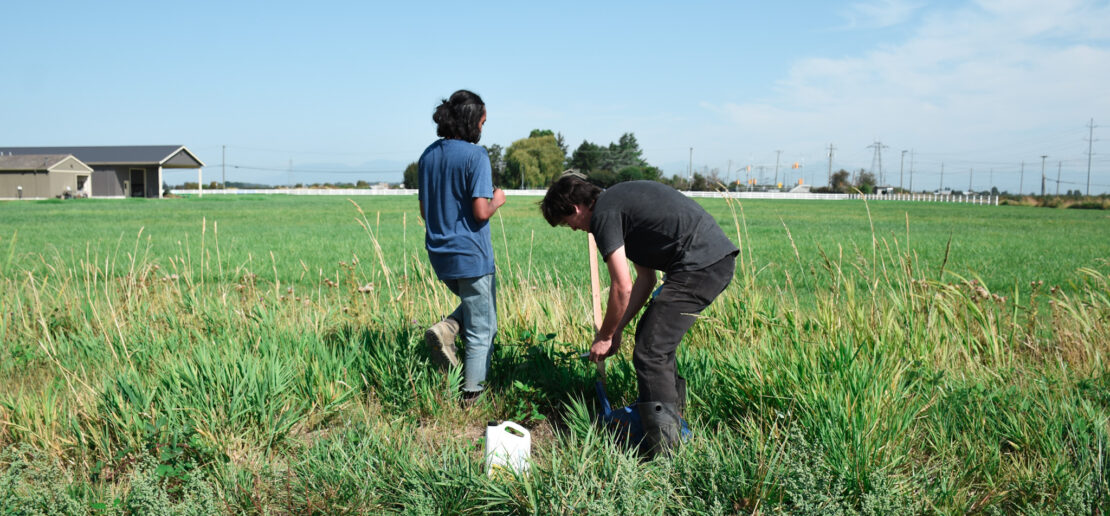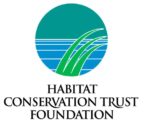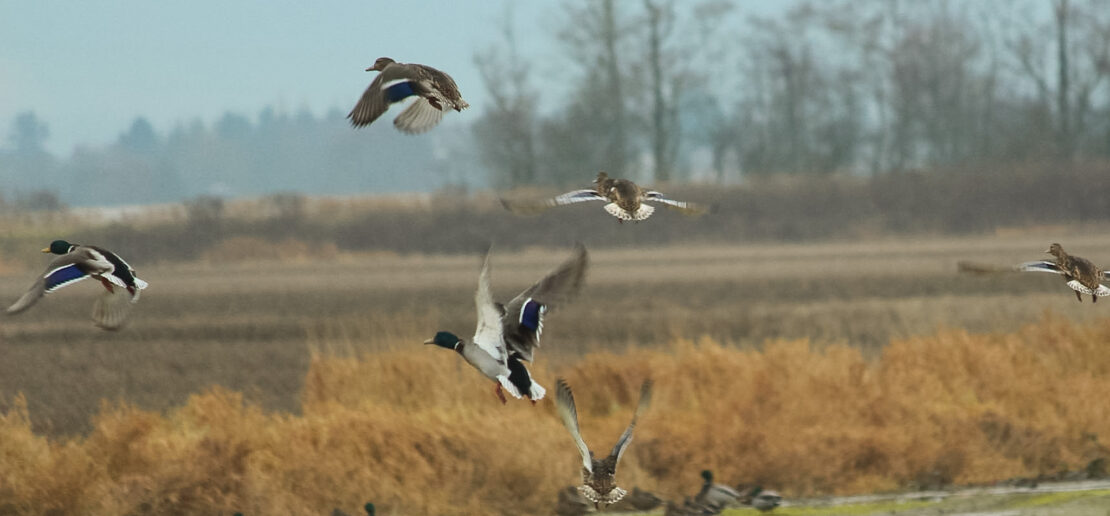About Us
At Delta Farmland and Wildlife Trust (DFWT), we help farmers implement sustainable agricultural practices to improve productivity, and to maintain areas of wildlife habitat on their farms. We do this through a combination of stewardship programs that offer funding to farmers, and research projects that examine the effectiveness of our current programs, and innovate with new ones.
Our non-profit organization was established in 1993 in Delta BC, by a group of local farmers and conservationists who were concerned about increasing pressures on farmland and wildlife habitat. They came together as “partners in stewardship” to promote the sustainable use of agricultural land. Delta gave them a unique vantage point from which to see the full effects of increasing land prices, growing urban development, and dwindling resources, on farming and wildlife. Situated along the Fraser River Estuary, Delta’s green spaces, wetlands, and agricultural fields provide annual foraging and resting sites for millions of migratory birds, as well as shelter for native wildlife year round. It is also home to a thriving farming community just a short drive from Vancouver and Richmond’s urban sprawl.
The founding members believed, as we do now, that it is critical to preserve and sustain local farmland, both for its role in food production and as a valued source of wildlife habitat and ecosystem services. They also believed that the way to achieve their goals was through environmentally sound – and economically viable – agricultural practices.

Our Team
Our Stewardship Programs integrate research, education, and financial incentives to promote the sustainable use of Today, DFWT is led by a volunteer Board of Directors drawn from the Delta Farmers Institute (3) and the Boundary Bay Conservation Committee (3), with 3 Directors-at-large. The Trust also employs a small staff to carry out research and program activities.
Office Manager
Valerie Miller
Executive Director
Christine Schmalz
Research and Field Technician
Connor
Hawey
Research and Field Technician
Patricia Kulikowski
Program Coordinator
April Stainsby
Contact Information
Phone
604-940-3392 (ph)
604-946-7820 (fx)
Hours
Please Note: Our office is generally open during business hours, however, with a small core staff, if we are at a meeting or out for lunch, the office may be closed. If you are coming to see us, it is best to call and let us know.
Thank you
Location
205 - 4882 Delta Street
Delta, British Columbia
V4K 2T8
If you would like to learn more about our stewardship programs, research, or community outreach activities, please contact our office. Our staff would be happy to answer your questions.
Contact Us
Careers
Come work with the team at Delta Farmland & Wildlife Trust

Available Positions:
No open positions at this time.
Annual Reports

Published annually, these reports provide historical information on the DF&WT’s stewardship programs and wildlife monitoring.
Partners And Sponsors
Delta Farmland & Wildlife Trust relies on funding from a variety of sources. We thank the following organizations for partnering with us and providing significant funding to our stewardship programs.











This project was undertaken with the financial support of/Ce projet a été réalisé avec l’appui financier de:

Fraser River Estuary

The Fraser River estuary is a critical stopover along the Pacific Flyway migratory bird route. It is Canada’s most important region for migratory waterfowl and shorebirds in terms of abundance and diversity over the winter season. Annually, it is estimated that five million migratory birds use the Fraser River estuary as both critical staging and wintering habitat. This includes 15 species that are of global and continental importance. As a result, the Fraser River estuary has been designated as Canada’s top Important Bird Area, a Key Biodiversity Area, an internationally recognized wetland (RAMSAR Site), a site of Hemispheric Importance within the Western Hemisphere Shorebird Reserve Network and is a priority area under the North American Waterfowl Management Plan.
In the late 1800s the Fraser River estuary was dyked and drained for agriculture, which resulted in a significant decline of approximately 70% of the estuary wetlands. The estuary has continued to be impacted by urban and industrial development over the years resulting in the conversion of thousands of acres of upland, bird-friendly farmland to non-agricultural uses. Agricultural land is able to act as surrogate habitat for many wildlife species providing valuable feeding and resting habitat for a diversity of migratory birds. (Photo: Evan Leeson)
How You Can Help
Support Delta Farmland & Wildlife Trust
There are several ways to make a tax deductible donation to Delta Farmland and Wildlife Trust. You can donate through Canada Helps (click the link to the right to be transferred to their secure donation page) or simply mail us a cheque with your name and address. We are a registered charity (138397740 RR0001) and will provide a tax receipt for your donation.
Your donation will work towards conserving the regionally, nationally, and internationally important farmland and wildlife resources contained in the Fraser River delta.

Consider Leaving a Legacy Through Planned Giving
Leaving a gift in your will to the Delta Farmland & Wildlife Trust is a thoughtful way of ensuring the preservation of farmland and associated wildlife habitat will continue. If you would like more information on how a bequest will impact the conservation of farmland and wildlife habitat, please do not hesitate to contact the office by phone (604-940-3392) or e-mail us at [email protected]. To access our Planned Giving options, simply click the link below:
How Can You Help?
Your donation will work towards conserving important farmland and wildlife resources contained in the Fraser River delta.

